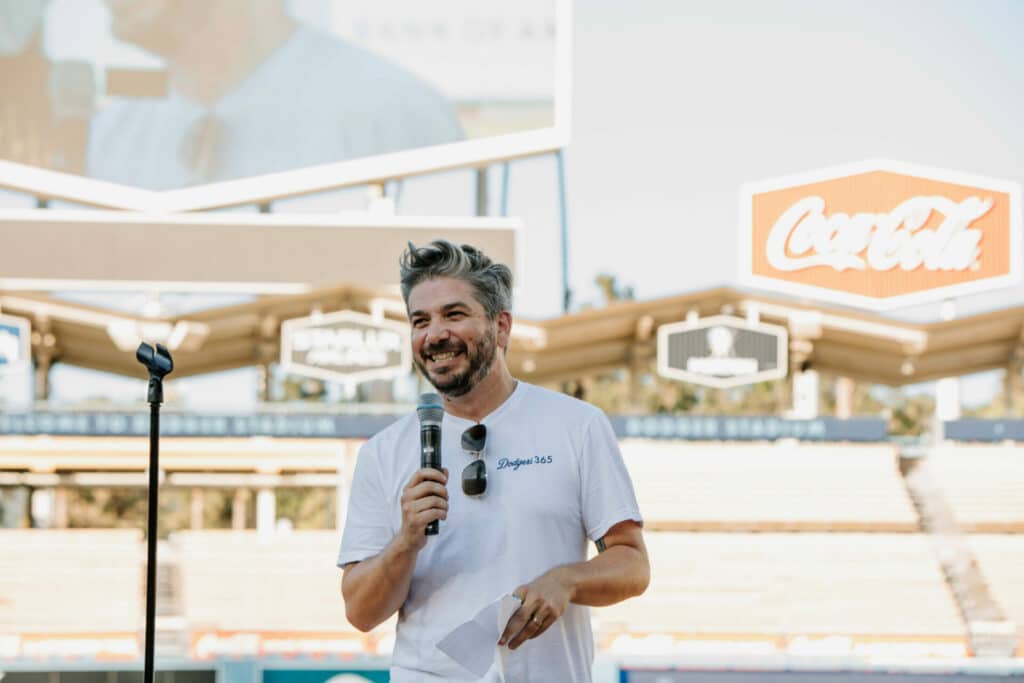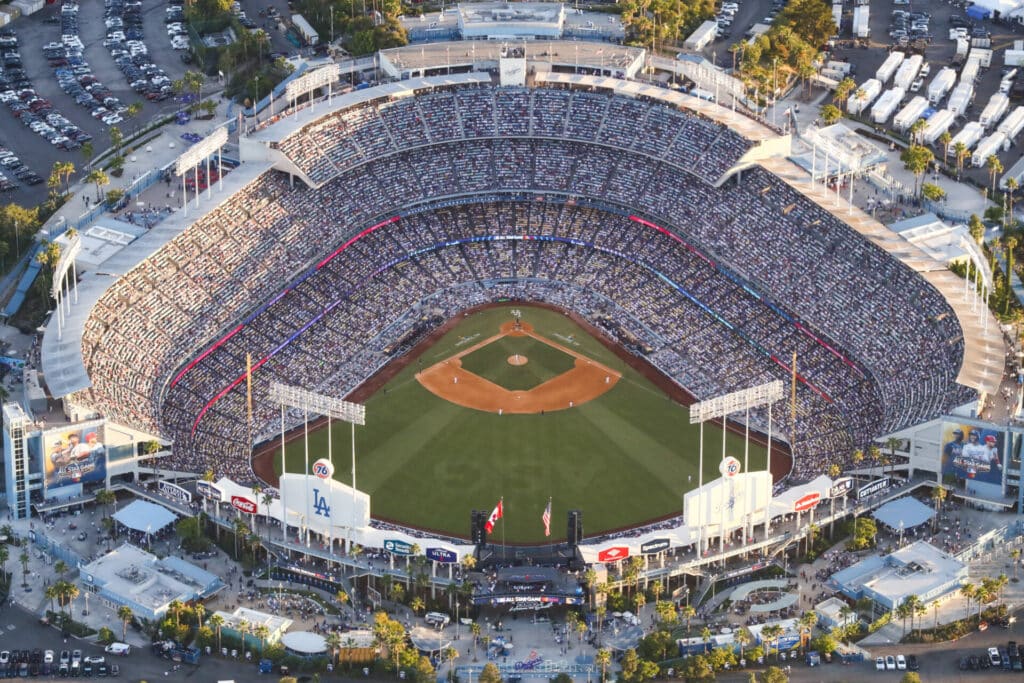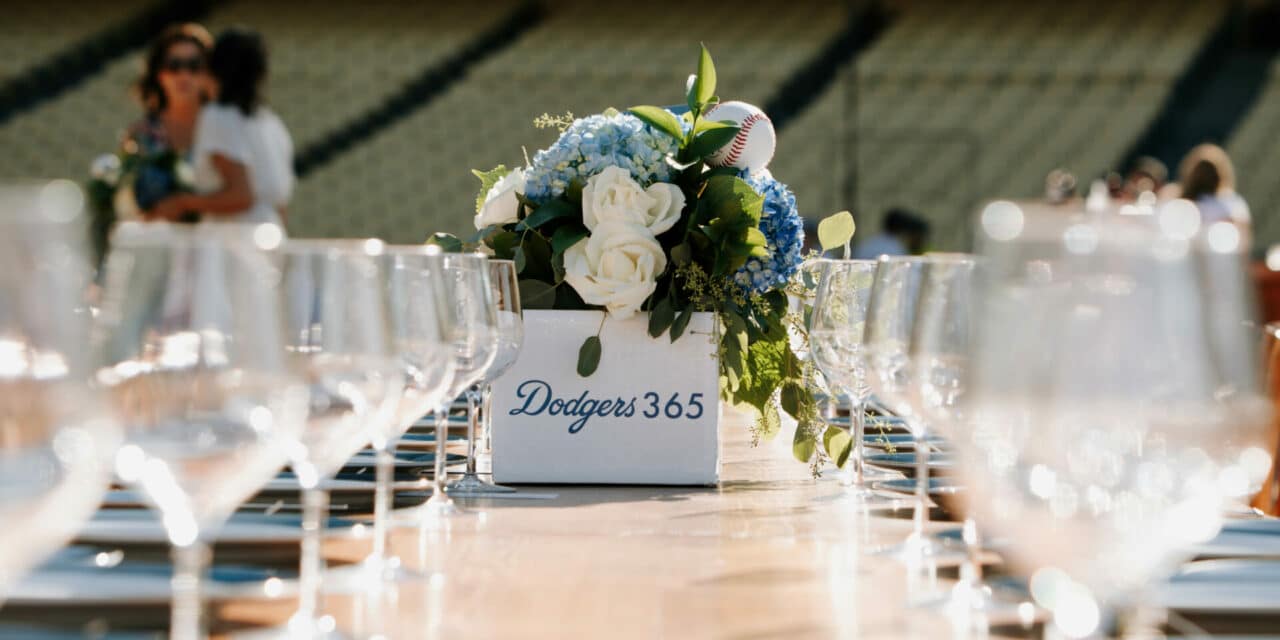TAKING THE FIELD: The Los Angeles Dodgers recently launched Dodgers 365, an initiative to create ancillary businesses within the stadium to produce more revenue when the team is on the road. (Kris Ryan/Dodgers)
TEAM LOOKS TO GROW NON-BASEBALL BIZ
Since acquiring the Los Angeles Dodgers and land surrounding the stadium for $2.15 billion 11 years ago, Guggenheim Management Group has led the history-rich franchise to nine Western Division championships, three National League pennants and a World Series title in 2020. As one of the best teams currently in the NL, the Dodgers are well on their way to securing another playoff berth, but ownership is hoping to secure more victories outside of baseball.
The team recently launched Dodgers 365, a new initiative that aims to bring more revenue streams by expanding non-baseball events and fully tapping into the potential of Major League Baseball’s third-oldest ballpark. Chris Koenig, recently hired as the Dodgers’ executive director of business enterprises, arrived from the San Francisco Giants to spearhead and develop the project.

MAN WITH VISION: Chris Koenig comes from the San Francisco Giants to spearhead Dodgers 365 and hopes to bring large-scale events such as concerts and soccer matches to the stadium as well as intimate gatherings. (Kris Ryan/Dodgers)
“The brand, Dodgers 365, that we’re launching, the name is completely intentional,” Koenig said. “We play 81 baseball games a year, plus some playoffs when we’re rolling, which has been most of the time. But that leaves a lot more days to program this place with interesting events and opportunities.”
Dodger Stadium has a storied history when it comes to non-baseball events, having hosted the Beatles, Elton John, Pope John Paul II and Madonna, but the venue hasn’t found consistent revenue streams outside of concerts.
Koenig may be the perfect man to expand the business. He began working events in 2007 at Exploratorium, a museum in San Francisco, and moved to work as rental sales and venue hospitality manager for SFJAZZ Center, a 700-capacity structure that exceeded more than $1.5 million in revenue under his leadership.
Much like the Dodgers are doing now with their initiative, the Giants had a similar mindset in 2017 when they hired Koenig. As the Bay Area team’s sales and business development manager, he developed other businesses within the stadium confines that became a hit with fans and generated additional income for the team. Koenig found a way to sell the stadium’s unique location by the bay with the launch of Giants Maritime, which allowed customers to host events by renting luxurious yachts by McCovey Cove, behind Oracle Park.
“The common thread between all the places that I’ve been is that they’ve always been a culturally or historically important place that was something else primarily — a museum, music venue, baseball stadium —where I was brought on to create an ancillary business on the side of what was happening,” Koenig said. “So, how do you create additional revenue streams knowing your identity, who you are, what the place and the market is? Who you are going after, and what would they be interested in that we have here?”
Those are the questions Koenig has posed to his new team at Dodger Stadium, a place he views as a “crown jewel.”

QUALITY OVER QUANTITY: The Dodgers want to offer unique experiences to fans, such as having dinner on the field. (Kris Ryan/Dodgers)
“It has this mystique about it that you can’t see unless you drive up the hill and go walk in,” Koenig said. “It has this allure, this history and a cultural importance in LA. We’re fortunate to have fantastic weather all year. The outdoor element here is real with the views, setting and (seven) levels. We’ve got a lot more to offer than meets the eye, and I don’t think people know that.”
Though late to the game, the Dodgers join a growing list of Major League Baseball franchises seeking business outside of the sport such as the Chicago Cubs, Boston Red Sox and San Diego Padres, and Koenig says that the few teams that have expanded their business ventures collaborate often to help each other.
“We meet off the field at least a couple of times a year, and go to the same conferences and help each other with ideas, because it’s important,” Koenig said. “With the success of the [the Dodgers], leading the league in attendance every year and knowing what the stadium means to baseball, to not have these non-baseball events and revenue stream churning at the same speed as everything else has always sort of surprised me. This has always been part of the conversation [among the ownership group] and something they want to be a part of.”
For the first official Dodgers 365 event on July 19, the team invited various business owners and media members to explore the stadium, which has gone through several renovations over the years, and enjoy dinner and a game of catch on the field. Ownership invested more than $100 million in 2021 to create a center field plaza that can be viewed as a “front door” to the stadium, constructing new elevators and bridges for better accessibility and a new sound system. This year, the team also renovated some of the club sections with premium seating and bars.
Koenig highlighted the new features to potential customers to show that Dodger Stadium is more than just a baseball diamond. The team launched its Dodgers 365 website to show that just about any part of the stadium — from the field to bars to the parking lot — is available for rent, and that any event can be upgraded in a way that only the Dodgers can offer in Los Angeles.

EVERY NOOK AND CRANNY: With Dodgers 365, the team is going to offer every section of the stadium for special events, from the field to bars to the parking lot. (Getty Images)
“Certainly, people are hungry for more high-touch experiences, and we could create the environment for it,” Koenig said. “When the team is out of town, we need to be programming the building. If there’s not a concert here, we’re figuring out other ways to fill it.”
One way is bringing other sports into the iconic venue, and it doesn’t have to be as grand as the NHL’s Stadium Series outdoor hockey game in 2014 between the Los Angeles Kings and Anaheim Ducks. Koenig wants to welcome all kinds of athletes, even pickleball players.
“I think as we continue on putting a focus on building out this portfolio of offerings, we’ll start using the stadium a lot different than we have before,” Koenig said. “Other sporting events are attractive to us, like a Topgolf, but certainly soccer matches such as high-profile international matches.”
But not every event at the stadium has to be one that draws tens of thousands of people. Koenig’s plan is to offer intimate experiences, similar to the one people experienced at the launch of Dodgers 365. Seeing people excited on the field and taking photos at home plate only inspired Koenig to continue building such experiences.
“I always challenge myself to tell the story of [the venue] in different ways,” he said. “If you need a place for 50,000 people, we got you for sure, but with these smaller venues throughout the stadium, there’s ways to use the stadium in a different light.
“I’m a quality over quantity guy, and for the events that we self-produce, we want it to be a high-touch, thoughtful experiential type of event where people walk away saying, ‘Wow; they put a lot of thought and care from the moment that I walked up and checked in and to the moment that I walked out and everything in between there.’”







